Una sitemap XML agisce come una tabella di marcia per i motori di ricerca, guidandoli verso tutte le pagine e i contenuti importanti del vostro sito web. Questo li aiuta a scoprire e indicizzare i vostri contenuti in modo più efficiente, garantendo la visibilità del vostro sito web nei risultati di ricerca.
Su WPBeginner, utilizziamo All in One SEO per generare automaticamente sitemap XML e per avere un maggiore controllo, come la possibilità di escludere alcune tassonomie. Tuttavia, abbiamo cercato altri modi per creare sitemap per WordPress, in modo che possiate scegliere il metodo più adatto al vostro sito web.
In questo articolo spiegheremo cos’è una sitemap XML e come potete creare facilmente una sitemap in WordPress. Vi spiegheremo come farlo con e senza plugin e vi mostreremo come inviare la vostra sitemap ai motori di ricerca in modo che il vostro sito venga indicizzato più velocemente.
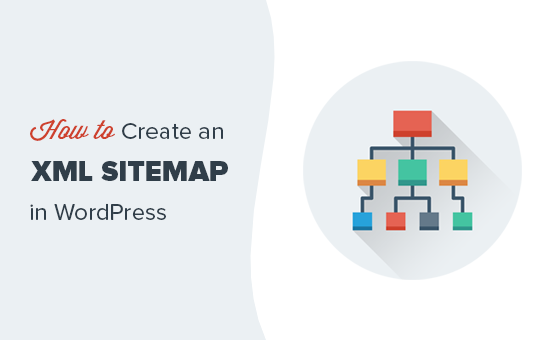
Che cos’è una Sitemap XML?
Una sitemap XML è un file che elenca tutti i contenuti del vostro sito web in un formato XML, in modo che i motori di ricerca come Google possano facilmente scoprire e indicizzare i vostri contenuti.
All’inizio degli anni 2000, i siti web governativi avevano un link sulla pagina principale intitolato “Sitemap”. Questa pagina di solito conteneva un elenco di tutte le pagine importanti del sito web.
Sebbene alcuni siti web abbiano ancora oggi pagine sitemap in HTML, l’uso generale delle sitemap si è evoluto nel corso degli anni.
Oggi le sitemap sono pubblicate in un formato file XML invece che in HTML e il loro pubblico di riferimento sono i motori di ricerca e non le persone.
Fondamentalmente, una sitemap XML è un modo per i proprietari di siti web di indicare ai motori di ricerca tutte le pagine esistenti sul loro sito.
Indica inoltre ai motori di ricerca quali link sono più importanti di altri e la frequenza di aggiornamento del sito.
Sebbene le sitemap XML non aumentino le classifiche dei motori di ricerca, esse consentono ai motori di ricerca di effettuare una migliore scansione del sito web. Ciò significa che possono trovare più contenuti e iniziare a mostrarli nei risultati di ricerca, con conseguente aumento del traffico di ricerca e miglioramento delle classifiche SEO.
Perché è necessaria una Sitemap XML
Le sitemap sono estremamente importanti dal punto di vista dell’ottimizzazione dei motori di ricerca (SEO).
La semplice aggiunta di un file sitemap non influisce sulle classifiche di ricerca. Tuttavia, se sul vostro sito c’è una pagina che non è indicizzata, una sitemap permetterà ai motori di ricerca di sapere chi siamo.
Le sitemap sono estremamente utili quando si apre un blog o si crea un nuovo sito web, perché la maggior parte dei nuovi siti non ha backlink. Questo rende più difficile per i motori di ricerca scoprire tutti i vostri contenuti.
Per questo motivo i motori di ricerca come Google e Bing consentono ai proprietari di nuovi siti web di inviare una sitemap nei loro strumenti per webmaster. In questo modo i bot dei motori di ricerca possono scoprire e indicizzare facilmente i contenuti del sito (per saperne di più).
Le sitemap sono altrettanto importanti anche per i siti web affermati e popolari. Permettono di evidenziare quali parti del sito sono più importanti e quali vengono aggiornate più frequentemente, in modo che i motori di ricerca possano indicizzare i contenuti di conseguenza.
Detto questo, vediamo come creare una sitemap XML in WordPress.
Video tutorial
Se preferite le istruzioni scritte, continuate a leggere.
Esistono diversi modi per creare una sitemap XML in WordPress. Vi mostreremo tre metodi popolari per creare una sitemap XML in WordPress. Vi mostreremo anche come inviare le sitemap ai motori di ricerca e come utilizzarle per far crescere il vostro sito.
Metodo 1: Creare una Sitemap XML in WordPress senza un plugin
Questo metodo è molto elementare e limitato in termini di funzioni.
Prima dell’agosto 2020, WordPress non disponeva di sitemap integrate. Tuttavia, con WordPress 5.5 è stata rilasciata una funzione di sitemap XML di base.
Questa funzione consente di creare automaticamente una sitemap XML in WordPress senza utilizzare un plugin. È sufficiente aggiungere wp-sitemap.xml alla fine del vostro nome di dominio, in questo modo:
https://www.example.com/wp-sitemap.xml
WordPress mostrerà la sitemap XML predefinita.
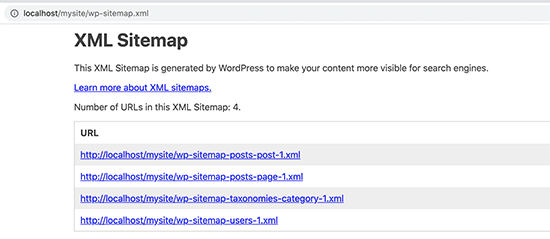
Questa funzione di sitemap XML è stata aggiunta a WordPress per garantire che ogni nuovo sito WordPress non perda i vantaggi SEO di una sitemap XML.
Tuttavia, non è molto flessibile e non è possibile controllare facilmente cosa aggiungere o rimuovere dalle sitemap XML.
Fortunatamente, quasi tutti i migliori plugin SEO per WordPress sono dotati di una propria funzionalità di sitemap. Queste sitemap sono migliori e potete controllare quali contenuti rimuovere o escludere dalle sitemap XML di WordPress.
Metodo 2: Creare una Sitemap XML in WordPress con AIOSEO
Il modo più semplice per creare una sitemap XML in WordPress è utilizzare il plugin All in One SEO (AIOSEO) per WordPress.
È il miglior plugin SEO per WordPress sul mercato, che offre un generatore di sitemap e una serie completa di strumenti per ottimizzare i post del blog per la SEO.
Per prima cosa, è necessario installare e attivare il plugin All in One SEO. Per maggiori dettagli, consultate la nostra guida passo passo su come installare un plugin di WordPress.
La funzione sitemap è disponibile anche nella versione gratuita di AIOSEO. Tuttavia, per ottenere sitemap avanzate di notizie e video, è necessaria la versione Pro.
Dopo l’attivazione, andare alla pagina All in One SEO ” Sitemaps per rivedere le impostazioni della sitemap.
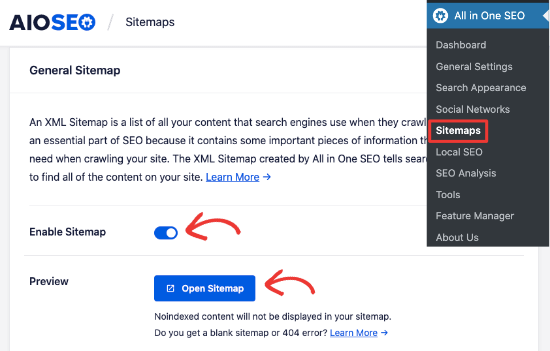
Per impostazione predefinita, All in One SEO abilita la funzione Sitemap e sostituisce le sitemap di base di WordPress.
È possibile fare clic sul pulsante “Apri Sitemap” per visualizzarne l’anteprima. È possibile visualizzare la sitemap anche aggiungendo sitemap.xml all’URL del sito web, come ad esempio:
https://www.example.com/sitemap.xml
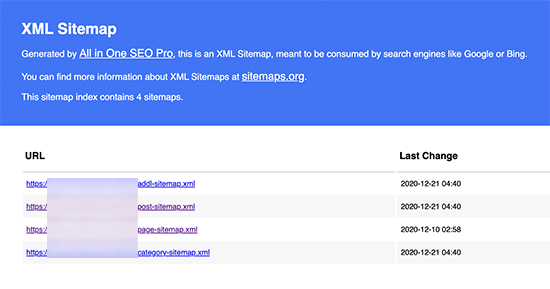
Per i principianti non è necessario fare nulla, poiché le impostazioni predefinite funzionano per tutti i tipi di siti web, blog e negozi online.
Tuttavia, è possibile personalizzare le impostazioni della sitemap per controllare cosa includere nella sitemap XML.
È sufficiente scorrere verso il basso fino alla sezione “Impostazioni Sitemap”.
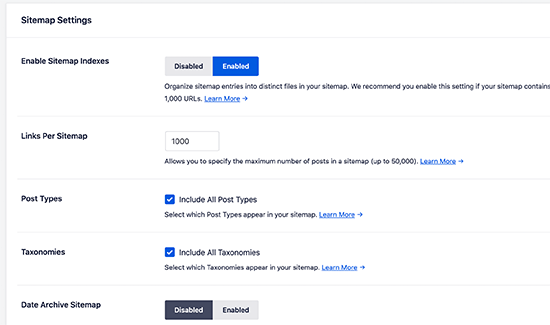
Questa sezione offre le opzioni per gestire gli indici delle sitemap e includere o escludere i tipi di post e le tassonomie(categorie e tag). È inoltre possibile abilitare le sitemap XML per gli archivi basati sulla data e gli archivi degli autori.
All in One SEO include automaticamente tutti i contenuti di WordPress nelle sitemap XML. Ma cosa succede se avete pagine autonome come un modulo di contatto, una landing page o pagine di negozi Shopify che non fanno parte di WordPress?
AIOSEO è l’unico plugin che consente di aggiungere pagine esterne alla sitemap di WordPress. Basta scorrere la sezione “Pagine aggiuntive” e attivarla. Verrà visualizzato un modulo in cui è possibile aggiungere le pagine personalizzate che si desidera includere.
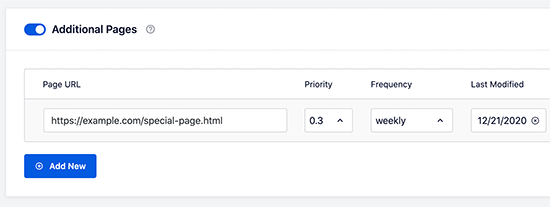
È sufficiente aggiungere l’URL della pagina che si desidera includere e impostare una priorità, dove 0,0 è la più bassa e 1,0 la più alta. Se non si è sicuri, si consiglia di usare 0.3.
Quindi, scegliere la frequenza degli aggiornamenti e la data dell’ultima modifica della pagina.
È possibile fare clic sul pulsante “Aggiungi nuovo” per aggiungere altre pagine.
Non dimenticate di fare clic sul pulsante “Salva modifiche” per memorizzare le impostazioni.
Esclusione di post e pagine specifici dalla Sitemap XML
All in One SEO consente di escludere qualsiasi post o pagina dalle sitemap XML. È possibile farlo facendo clic sulla sezione “Impostazioni avanzate” nella pagina All in One SEO ” Sitemaps.
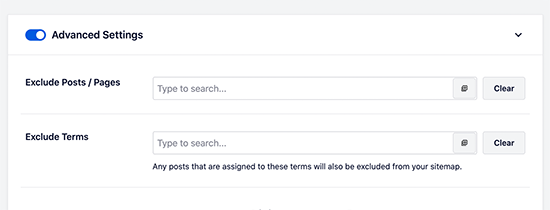
È anche possibile rimuovere un post o una pagina dalle sitemap XML rendendoli no-index e no-follow. In questo modo i motori di ricerca non visualizzeranno quel contenuto nei risultati di ricerca.
È sufficiente modificare il post o la pagina che si desidera escludere e scorrere fino alla casella Impostazioni AIOSEO sotto l’editor.
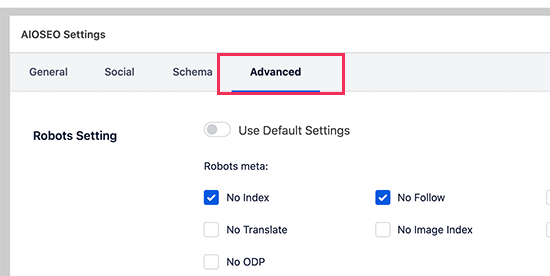
Da qui è necessario passare alla scheda Avanzate e selezionare le caselle accanto alle opzioni “Nessun indice” e “Nessun seguito”.
Creare Sitemaps aggiuntive
All in One SEO consente di creare sitemap aggiuntive, come quella dei video o delle notizie.
È possibile creare una sitemap video se si inseriscono regolarmente video nei post o nelle pagine del blog. In questo modo i motori di ricerca potranno visualizzare i post nei risultati di ricerca e i video insieme a una miniatura del video.
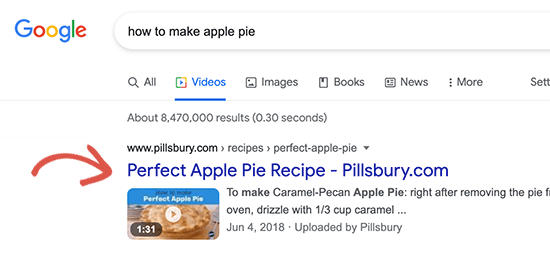
È inoltre possibile creare una sitemap News se si gestisce un sito web di notizie e si desidera apparire nei risultati di ricerca di Google News.
Basta andare su All in One SEO ” Sitemaps e passare alle schede Video Sitemap o News Sitemap per generare queste sitemaps.
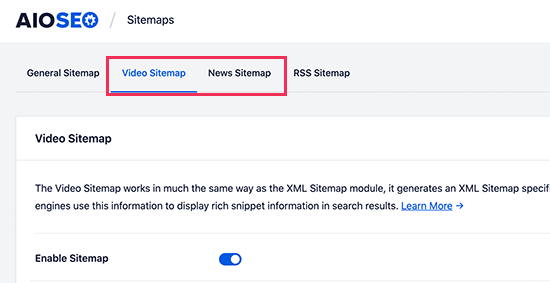
Nel complesso, AIOSEO è il miglior plugin per WordPress perché offre tutta la flessibilità e le potenti funzionalità a un prezzo molto conveniente.
Metodo 3: Creare una Sitemap XML in WordPress con Yoast SEO
Se utilizzate Yoast SEO come plugin per la SEO di WordPress, allora attiva automaticamente anche le sitemap XML.
Per prima cosa, è necessario installare e attivare il plugin Yoast SEO. Per maggiori dettagli, consultate la nostra guida passo passo su come installare un plugin di WordPress.
Dopo l’attivazione, andare alla pagina SEO ” Generale e passare alla scheda “Caratteristiche”. Da qui, è necessario scorrere verso il basso fino all’opzione “Sitemap XML” e assicurarsi che sia attivata.
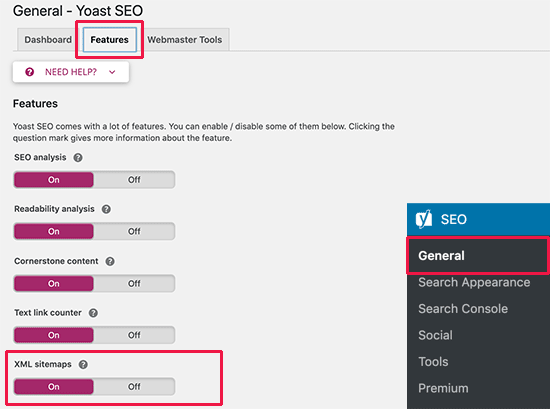
Quindi, fare clic sul pulsante “Salva modifiche” per memorizzare le modifiche.
Per verificare che Yoast SEO abbia creato una sitemap XML, è possibile fare clic sull’icona del punto interrogativo accanto all’opzione “sitemap XML” nella pagina.
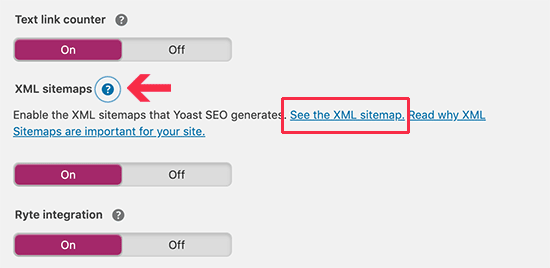
Successivamente, fare clic sul link “Vedi la Sitemap XML” per visualizzare la sitemap XML generata da Yoast SEO.
È possibile trovare la sitemap XML semplicemente aggiungendo sitemap_index.xml alla fine dell’indirizzo del sito web. Ad esempio:
https://www.example.com/sitemap_index.xml
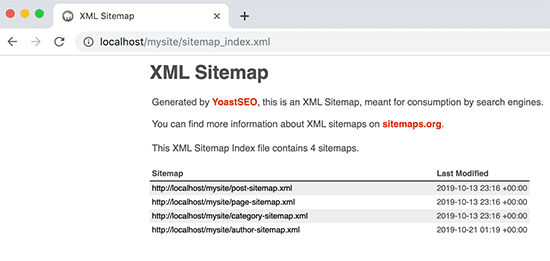
Yoast SEO crea sitemap multiple per diversi tipi di contenuto. Per impostazione predefinita, genera sitemap per post, pagine, autori e categorie.
Invio della Sitemap XML ai motori di ricerca
I motori di ricerca sono molto abili nel trovare una sitemap. Ogni volta che si pubblicano nuovi contenuti, viene inviato un ping a Google e Bing per informarli delle modifiche apportate alla sitemap.
Tuttavia, si consiglia di inviare la sitemap manualmente per garantire che i motori di ricerca la trovino.
Invio della Sitemap XML a Google
Google Search Console è uno strumento gratuito offerto da Google per aiutare i proprietari di siti web a monitorare e mantenere la presenza del loro sito nei risultati di ricerca di Google.
L’aggiunta della sitemap a Google Search Console aiuta a scoprire rapidamente i contenuti, anche se il sito è nuovo di zecca.
Innanzitutto, è necessario visitare il sito web di Google Search Console e registrare un account.
Successivamente, verrà chiesto di selezionare un tipo di proprietà. È possibile scegliere un dominio o un prefisso URL. Si consiglia di scegliere un prefisso URL, perché è più facile da configurare.
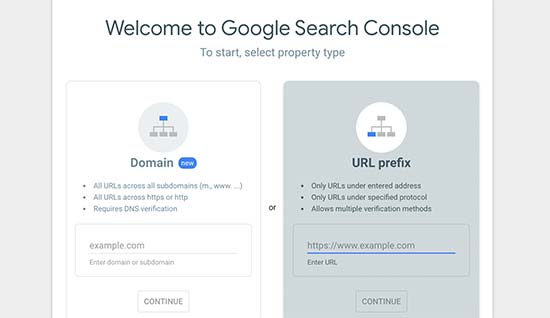
Inserite l’URL del vostro sito web e fate clic sul pulsante “Continua”.
Successivamente, vi verrà chiesto di verificare la proprietà del sito web. Verranno visualizzati diversi metodi per farlo. Si consiglia di utilizzare il metodo del tag HTML.
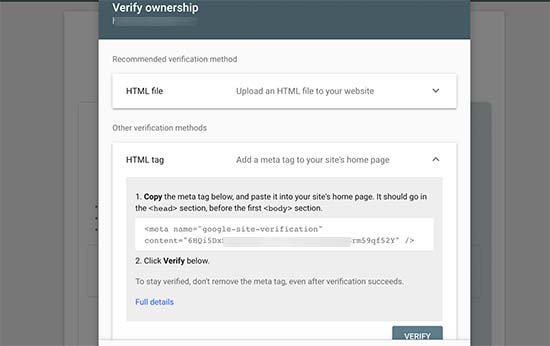
È sufficiente copiare il codice sullo schermo e poi andare nell’area di amministrazione del vostro sito WordPress.
Se si utilizza AIOSEO, la verifica degli strumenti per i webmaster è semplice. Basta andare su All in One SEO ” Impostazioni generali e poi fare clic sulla scheda “Strumenti per i Webmaster”. Dopodiché, è possibile inserire il codice di Google.
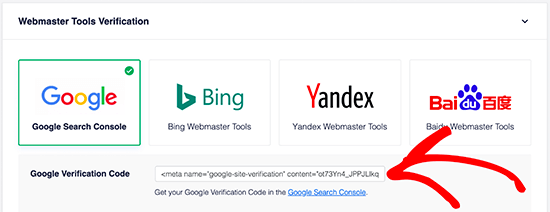
Se non si utilizza AIOSEO, è possibile inserire il codice utilizzando il plugin WPCode. Questo è il modo più sicuro e semplice per aggiungere codice al vostro sito WordPress.
È necessario installare e attivare il plugin gratuito WPCode. Per maggiori dettagli, consultate la nostra guida passo-passo su come installare un plugin di WordPress.
Dopo l’attivazione, è necessario visitare la pagina Code Snippets ” Header & Footer e aggiungere il codice copiato in precedenza nella casella “Header”.
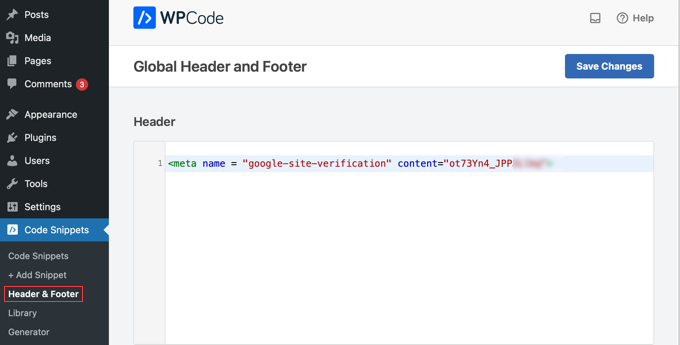
Non dimenticate di fare clic sul pulsante “Salva modifiche” per memorizzare le modifiche.
Ora, tornate alla scheda Google Search Console e fate clic sul pulsante “Verifica”.
Google verificherà la presenza di un codice di verifica sul vostro sito e lo aggiungerà al vostro account Google Search Console.
Nota: se la verifica non ha esito positivo, assicurarsi di cancellare la cache di WordPress e riprovare.
Ora che avete aggiunto il vostro sito web, aggiungete anche la vostra sitemap XML.
Dalla dashboard del vostro account, dovete cliccare su “Sitemaps” dalla colonna di sinistra.

Successivamente, è necessario aggiungere l’ultima parte dell’URL della sitemap nella sezione “Aggiungi una nuova sitemap” e fare clic sul pulsante “Invia”.
Google aggiungerà ora l’URL della sitemap alla Google Search Console.
Google impiegherà un po’ di tempo per effettuare il crawling del vostro sito web. Dopo un po’ di tempo, sarà possibile visualizzare le statistiche di base della sitemap.
Queste informazioni includono il numero di link che Google ha trovato nella vostra sitemap, quanti di essi sono stati indicizzati, il rapporto tra immagini e pagine web e altro ancora.
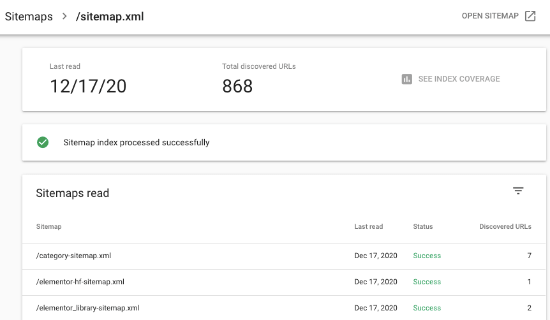
Invio della Sitemap XML a Bing
Analogamente a Google Search Console, anche Bing offre Bing Webmaster Tools per aiutare i proprietari di siti web a monitorare il proprio sito nel motore di ricerca Bing.
Per aggiungere la sitemap a Bing, è necessario visitare il sito web Bing Webmaster Tools.
Qui vengono visualizzate due opzioni per aggiungere il sito. È possibile importare il sito da Google Search Console o aggiungerlo manualmente.
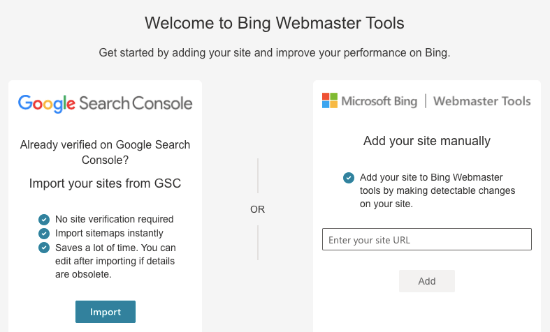
Se avete già aggiunto il vostro sito a Google Search Console, vi consigliamo di importarlo. Si risparmia tempo perché la sitemap viene importata automaticamente.
Se si sceglie di aggiungere il sito manualmente, è necessario inserire l’URL del sito e verificarlo.
Bing vi chiederà ora di verificare la proprietà del vostro sito web e vi mostrerà diversi metodi per farlo.
Si consiglia di utilizzare il metodo dei tag meta. È sufficiente copiare la riga del meta tag dalla pagina e dirigersi verso la propria dashboard di WordPress.
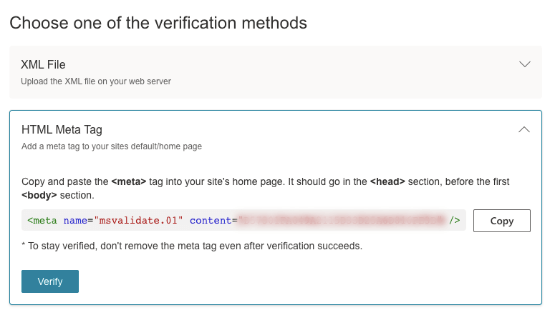
Ora, installate e attivate il plugin WPCode Free sul vostro sito web.
Dopo l’attivazione, è necessario visitare la pagina Code Snippets ” Header & Footer e aggiungere il codice copiato in precedenza nella casella “Header”.
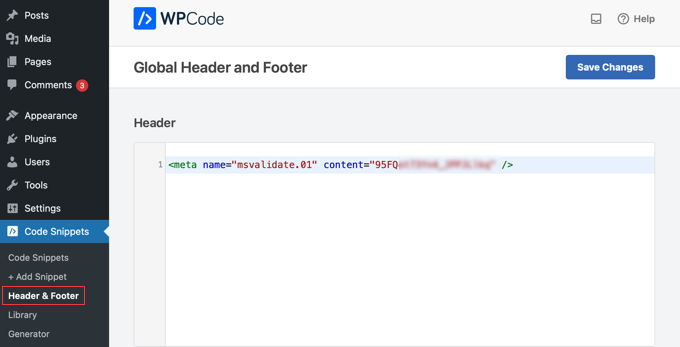
Non dimenticate di fare clic sul pulsante “Salva modifiche” per memorizzare le modifiche.
Usare i sitemap XML per far crescere il vostro sito web
Ora che avete inviato la sitemap XML a Google e Bing, vediamo come utilizzarla per il vostro sito web.
Innanzitutto, è necessario tenere presente che la sitemap XML non migliora le classifiche di ricerca. Tuttavia, aiuta i motori di ricerca a trovare i contenuti, a regolare il crawl rate e a migliorare la visibilità del sito web nei motori di ricerca.
È necessario tenere sotto controllo le statistiche della sitemap in Google Search Console. Può mostrare gli errori di crawl e le pagine escluse dalla copertura di ricerca.
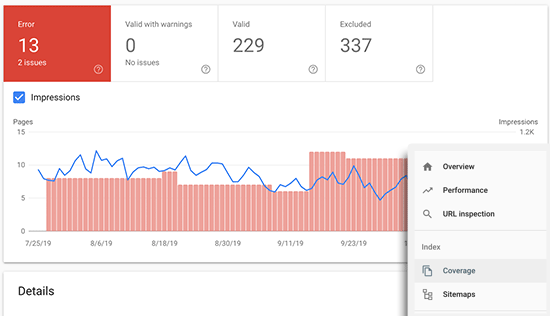
Sotto i grafici, è possibile fare clic sulle diverse tabelle.
Qui è possibile visualizzare quali URL effettivi sono stati esclusi o non indicizzati da Google.
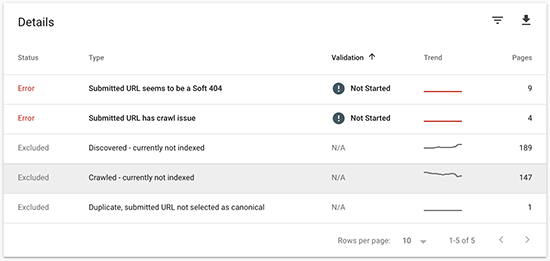
Normalmente, Google può decidere di ignorare i contenuti duplicati, le pagine prive di contenuto o con contenuto molto scarso e le pagine escluse dal file robots.txt o dai meta tag del sito.
Tuttavia, se il numero di pagine escluse è insolitamente alto, si consiglia di controllare le impostazioni del plugin SEO per assicurarsi che non sia stato bloccato alcun contenuto.
Per maggiori dettagli, consultate la nostra guida completa a Google Search Console per i principianti.
Speriamo che questo articolo vi abbia aiutato a conoscere le sitemap XML e a creare una sitemap XML per il vostro sito WordPress. Potreste anche voler consultare la nostra guida su come creare una sitemap multilingue in WordPress e le nostre scelte di esperti sui migliori strumenti di ricerca di parole chiave per scrivere contenuti migliori.
Se questo articolo vi è piaciuto, iscrivetevi al nostro canale YouTube per le esercitazioni video su WordPress. Potete trovarci anche su Twitter e Facebook.





Liv
This article was very helpful. I used the Yoast SEO method. Thank you
WPBeginner Support
You’re welcome, glad our guide could help
Admin
Suzanne
Thanks so much for this it was a massive help! Because I verified and uploaded to Google Console first, I managed to verify and import my website/sitemap to Bing by just connecting my google account (Bing gives you an option for this when you click on sign up) – it was done in less than 30 seconds! I wouldn’t have thought to do Bing, so thank you so much for covering that too!
WPBeginner Support
You’re welcome, glad our guide was helpful
Admin
Tasha
This is honestly the most helpful article I’ve ever seen. I’m not a developer (just new home business owner trying to figure out the rabbit hole that is web dev) and this guided me through all the unknowns I’d had about importance of a sitemap, let alone how it would benefit my site. THANK YOU SO MUCH!
WPBeginner Support
You’re welcome, glad our guide was helpful
Admin
Brittney Gage
I rarely write comments on articles but this was easily one of the most helpful I’ve ever read. Thank you!
WPBeginner Support
Glad our article was helpful
Admin
Harish Nemade
I have my site with only one post published, so is it necessary to submit a sitemap each time when I added a new Article/Post?
And how often should I submit sitemap?
WPBeginner Support
You only need to submit your sitemap once unless there is an error, it will update as you add posts.
Admin
Image Earth Travel
Great article!
Yt’s a pain that the Yoast plugin (as with all plugins) are only offered on the WP’s Business Plan. I’ve been on the Premium Plan and not allowed to install plugins.
WPBeginner Support
Thank you, part of the confusion may be due to our articles being for WordPress.org sites which require hosting instead of the business plan on WordPress.com https://www.wpbeginner.com/beginners-guide/self-hosted-wordpress-org-vs-free-wordpress-com-infograph/
https://www.wpbeginner.com/beginners-guide/self-hosted-wordpress-org-vs-free-wordpress-com-infograph/
Admin
Sarah
I am using the free Yoast SEO plugin but I am not seeing SEO » XML Sitemaps. Any ideas? Thanks
WPBeginner Support
Yoast has updated their interface so you should find it under SEO>General>Features at the moment.
Admin
flyingvan
Thanks for this tutorial, I could activate the sitemap on my website thanks to you.
Mat
WPBeginner Support
You’re welcome, glad our article could be helpful
Admin
Sara
Hello,
Recently I added the sitemap for my website. But, while checked with the tool, it’s showing, no sitemap is added. Why it’s showing like this. I added Yoast SEO plugins.
WPBeginner Support
It could be their caching or if your site has caching that you haven’t cleared it could be part of the issue.
Admin
Jishnu.M
Hi,
I have a problem with sitemap submitting….I am using Yoast SEO when I submit a sitemap to google webmaster it says “couldn’t fetch”…….. but i have successfully submitted sitemap to bing and Yandex without any errors …what to do please help me
WPBeginner Support
For an error like this, you may need to reach out to Yoast’s support to see their recommended troubleshooting for specifically Google not being able to crawl your sitemap.
Admin
Sajol Fuad
I am really happy to get this article about sitemap.
I am using Yoast SEO for sitemaps. Some SEO auditor is saying that I should improve it immediately. But Google search console is showing a green success and assuring that all is ok.
Can you please suggest me what should I do right now?
Thanks for the article..
WPBeginner Support
We’re using the Yoast sitemap without any issues at the moment. If you would prefer what the auditor wants then you could certainly try that if you wanted.
Admin
Charles Harris
I have Yoast SEO but XML sitemaps does not appear on the menu, which indeed looks very different from yours. Any suggestions as to how to find it?
WPBeginner Support
For the current Yoast interface, the Sitemap options are under SEO>General>Features
Admin
Charles Harris
Thanks – got it now.
Joseph
I need some help please,
some pages on my website are not showing on sitemap.xml
I entered it manually to google console, It showed an error that the sitemap format is HTML and that I should change the format
how do I change sitemap format, please?
WPBeginner Support
If you’re using a caching plugin you may want to try to disable it to see if it could be a conflict between Yoast and the caching plugin you’re using.
Admin
Ravi
Hi, awesome tutorial, I did same as your instruction and working fine. But there’s a problem with this, check out the details.
my website is yahoonewsz.com and when I type “www.example.com/sitemap_index.xml”, it works fine but it says page not found when typed “example.com/sitemap_index.xml”.
Why?
WPBeginner Support
You may want to check with your hosting provider that there is not a setting preventing the non www version from redirecting properly
Admin
Arun Dixit
Thanks for your best tutorial!
I recently have a wordpress blog and have created xml sitemap using yoast seo, according to this tutorial in previous month. Yesterday I happend to see my xmlsitemap file at my wp-admin. There are only 5-6 lines which covers my new posts only. What about my old posts? Is there any problem? And how come I know that there is any problem? Because I have more than dozen posts till now.
Kindly let me know.
Arun Dixit
WPBeginner Support
You may want to clear your caching and reach out to Yoast if your sitemap is refusing to update your older posts if you’re not excluding them.
Admin
Darko Loncar
I am using All in One SEO pack Plugin. If I download Yoast’s WordPress SEO plugin should I use both?
WPBeginner Support
No, we would not recommend having multiple SEO plugins active as they can conflict with each other.
Admin
Kirti Goyal
THANKS FOR SHARING THIS INFORMATION!
one thing I want to know is that whether after every single update in pages, posts or change within a post, we need to submit the sitemap???
Looking forward to hearing from you.
WPBeginner Support
You should not need to resubmit your sitemap as long as Google does not run into any errors with your sitemap and with the method from our article it should over time update your sitemap.
Admin
Viraj
Please guide me to make a news sitemap for google news submission.
Luke
I followed these steps but search console is giving me a 404 on the sitemap. I never had such problems submitting sitemaps
Mohammed
In my website, I generated sitemap using this tutorial, however I want to remove one particular non-existent URL from the sitemap as it’s giving 404 error and google adsense is showing crawl error. How do I remove one particualr URL from sitemap and ask google to stop crawling that URL?
Ernest
I see some websites have multiple sitemaps. Is it really necessary?
Dibyajyoti
not really. But some large website for multiple purpose .
greeshma
is sitemaps still relevant in 2018?
WPBeginner Support
Hi Greeshma,
Yes, they are.
Admin
PRANITA DESHPANDE
My site has been verified but can’t find site map near to it .What to do for it ?
cher
I did your step for the sitemap. Awesome! Also, for my robots.txt file I have the following, should I change that first line of sitemap to what yoast says? I am not even sure where I got that old sitemap from but don’t want to mess anything up.
WPBeginner Support
Hi Cher,
Yes, if you are using Yoast SEO, then you should add Yoast SEO sitemap.
Admin
Jude
Hi.
Very helpful information.
I want to ask if it is okay to submit my site to other webmasters like bing, yandex and others.
Thanks so much.
WPBeginner Support
Hi Jude,
Yes, it is OK.
Admin
jude
Thanks so much.
I can’t find my sitemap code in yoast.
I also can’t verify my site on other search console like yandex and bing. (i got cannot verify)
daguah
which social plugin do you use to show the number of shares?
jude
hi. you can use share count or sassy social share
Anshuman Konwar
Thank you Sir, this article is very helpful
William
Is there any one who can help me to change sitemap.xml to some new url like sitmap_page_xml
Leo August
Yoast SEO must have been updated because the check boxes are now sliders – at least on my site. When I enable the stiemap function, then click the link to view the site map, I get a 404 Not Found error. Did I do something wrong?
Rachael
Really helpful article! I have just having trouble when it comes to viewing my site map, it’s coming up with 404 error and I’m not sure why?
John
Hey, there’s nothing like SEO>XML Sitemap in my WP dashboard. Does this feature work on the Premium version of Yoast SEO only? Please help!
WPBeginner Support
Hi John,
It works with free version as well. You will need to enable ‘Advanced settings pages’. Go to SEO » Dashboard page and then click on ‘Features’ tab. Scroll down to Advanced settings page section and click to enable them. Don’t forget to click on the save changes button.
After reload you will see new menu items in under SEO menu. Hope this helps.
Admin
dotun
Hello, I still cant see the xml sitemap on my Wp dashboard.
what can I do?
Rozi
Having the same exact problem. This option does not appear anywhere on my wordpress dashboard. Were you able to get any help with this?
Awais
there is not sitemap option, please help, in fact if i go on “mysite.com/sitemap_index.xml” there i can find the sitemap but settings are not in my dashboard.
Uphoria
Under SEO > General > Features, down by where it says XML Sitemaps, click on the question mark to expand some text.
Click on See the SML sitemap. Then, you can add the URL for your sitemap to the Google Search Console.
Annissa
UPHOARIA, not all heroes wear capes, my friend. Thank you!!! After an hour of trying to figure this out, this was immensely helpful!
Craig Wambusii
after implying the details as clearly elaborated in the blog within a month i saw the changes in my rankings this trick works no hassle. there is a great improvement in my SEO optimization ranking.
Prakash Dayani
Thank you for putting this up nicely, i have one question though for which i need help.
If once i have submitted a sitemap to google and i also have my yoast SEO completely configured, then on adding new content will yoast only update the sitemap or will it automatically submit it to google as well? Or is it that i should submit the sitemap manually to google every time there is new content.
WPBeginner Support
Hi Prakash,
The sitemap generated by Yoast SEO automatically updates itself. You only need to submit your sitemap to Google once. However, if you move your website to a new address, then you will need to resubmit your sitemap.
Admin
Andrea Maria
A site map is a kind of interactive table of contents, in which each listed item links directly to its counterpart sections of the Web site.
Sofia
I have submitted my site map to google
But still not getting organic traffic
What should I do now???
Plzz help me
Desiree
Useful manual.
My sitemap only shows the homepage, and not the 29 other pages of my website. Any ideas on how I can solve this?
Thanks.
nizam
Great post for beginners. Thanks.
I have a question – my site has a subdomain if i create a sitemap for the subdomain will it be part of the whole site (root plus subdomain?)
Ryan
My Yoast Seo XML Sitemaps won’t work with google search console.
“We encountered an error while trying to access your Sitemap. Please ensure your Sitemap follows our guidelines and can be accessed at the location you provided and then resubmit.”
Any ideas?
Geraldine
Ok- your site is my new favorite best friend on the internet!! Thank you sooo much! I’m beginning to feel like a dangerous beginner Thanks for the great tutorials…
Thanks for the great tutorials…
Charmaine
A big thanks, guys! This guide helped me through.
Rebecca
excellent tutorial thank you
thank you
Bhavika Patel
Thank you so much for your instructions.
it was very useful for me.i did all steps and i could put my site map on webmaster tool and also my blog pages only because of your helpful article.
Mad
Error while submitting sitemap generated by yoast: sitemap_index.xml
Sitemap is HTML
Your Sitemap appears to be an HTML page. Please use a supported sitemap format instead.
Sola Mathew
Wow.
I just added my site map to Google.
Thanks so much.
Bruna
Hello, thank you for the detailed article, finally I understood how it works!
I think I did all correctly, but when I submitted the sitemap I received an error from Webmaster Tool, saying: “We encountered an error while trying to access your Sitemap. Please ensure your Sitemap follows our guidelines and can be accessed at the location you provided and then resubmit.”
Certainly the location is correct, and their guidelines don’t give me a clue of what is happening
Any idea? Thank you in advance.
Bruna
WPBeginner Support
Hi Bruna,
Try adding your website without www prefix. Google treats www and non-www as two separate domains.
Admin
Irfan
HI to wpbeginner team. 1st of all thank you for your excellent work and helping beginner in such a great way. I am using All in one Seo and came to know you use for your sites Yoast Seo. Can you guide me how do I shift to Yoast without messing up my sure??
Thank you in advance
WPBeginner Support
Hi Irfan,
Yoast SEO actually has a tool inside the plugin that will help you migrate.
Ammad Ali
i am trying to create sitemap and i created a lot of sitemap using different plugins but when i click on sitemap it says nothing found.
how to solve this issue
Matt
Under sitemaps, for webpages, it’s saying 104 were submitted, but only 14 were indexed. Yoast SEO gave me 3 sitemaps which I added.
Zinah
Thank you.it helped me to do my XML sitemap
Riwan nair
How xml sitemap will show to user?
Võ Điền
Great! Thank you for this tutorial!
Akin
I’m having lots of duplicate content on my website. I’m thinking that i didn’t fix the Yoasts SEO very well. How can i remove them?
Thanks in advance
WPBeginner Support
Hey Akin,
Please see our guide on how to install and setup Yoast SEO plugin. It will help you properly setup Yoast SEO plugin.
Admin